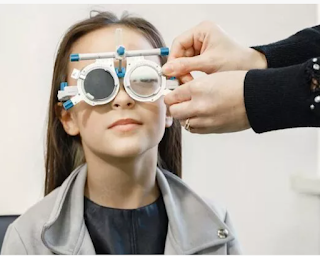Glaucoma-Causes, Risk Factors, Symptoms, Diagnosis, and Treatment
Glaucoma is a condition in which increased pressure in the eye can damage the optic nerve. If left untreated, it can get worse. It can even lead to permanent vision loss. If you or someone at your home is suffering from this condition, see an ophthalmologist in New Jersey.
Generally speaking, most people with this eye problem do not show early warning signs. Hence, it’s advisable to visit an eye specialist regularly for a routine eye checkup. It can help your doctor diagnose the condition at an early stage. As a result, the necessary treatment can be provided to you. Continue reading to learn about this condition's causes, symptoms, and risk factors. In the end, we will provide information on Glaucoma diagnosis and treatment.
Causes of Glaucoma
Did you know that the fluid inside your eye flows out of your eye through a channel? In case this channel gets blocked, it leads to a buildup of liquid.
As it can be inherited, if anyone in your family has this condition, you are at risk of developing this condition.
Other causes of glaucoma are-
Any injury to the eye.
Serious eye infection.
Blocked blood vessels inside the eye.
Any inflammatory condition.
Eye surgery was performed to correct another condition.
Mostly, it affects both eyes. But the condition is worse in one eye as compared to the other.
Risk Factors for Glaucoma-
Most commonly, it affects adults who are 40 or more years old. But that doesn’t mean it can’t affect young adults. Even infants can have this condition.
You’re at risk of developing this condition if you-
Are 40 years old or more.
Have vision problems.
Have a family history of this condition.
Have diabetes.
Consume certain steroid medications, bladder-controlling drugs, or other over-the-counter cold remedies.
Have thinner corneas.
Are suffering from high blood pressure.
Have heart disease.
Have high eye pressure.
Had a serious injury to your eyes.
In case you are living across New Jersey and suspect that you have these risk factors, see an Ophthalmologist that offers glaucoma diagnosis and treatment in NJ. Early diagnosis will help you get the desired treatment on time and save you from experiencing more serious conditions later.
Glaucoma symptoms-
Most people do not show signs until they reach the later stage of this condition. Perhaps, this is the reason why it is often called the "sneak thief of vision.” Most commonly, it leads to loss of side vision.
If you or anyone at your home show these signs, see an ophthalmologist in NJ or anywhere near your home.
Vision loss.
Seeing halos around lights.
Redness in the eye.
Stomach discomfort or vomiting.
Pain in the eye (or eyes).
Glaucoma Diagnosis and Treatment-
An eye specialist will review your medical history carefully. Based on it, he will conduct your comprehensive eye examination. In addition, he might perform a series of tests that includes-
Measuring intraocular pressure.
Performing imaging tests for optic nerve damage.
Visual field test to check for areas that show signs of vision loss.
Pachymetry is used to determine the thickness of the cornea.
Gonioscopy to inspect the drainage angle.
Though the damage caused to the eyes by this condition can’t be reversed, getting treatment from an ophthalmologist in New Jersey can help slow down vision loss.
Glaucoma Prevention-
It’s not possible to prevent glaucoma. But you can keep an eye on the signs and see your doctor regularly to lower the risk of developing this condition.
Here are a few steps that can help protect your vision-
Go for a regular eye examination.
Know your family history.
Follow your doctor’s recommendations strictly.
Exercise regularly.
Wear protective eyewear while playing sports.
Last but not least, always see an ophthalmologist in New Jersey (or near your home) when you experience any sign of this condition. Get the necessary treatment and take good care of your eyes.


Comments
Post a Comment